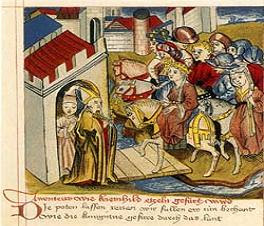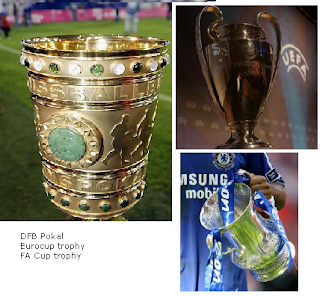This vehement, anti-Fifa editorial has been distilling for years. (F-I-F-A is from the title in French for soccer's world governing body.) Fifa has done some bad, foul, egregious, and completely fucking unacceptable things.
Bad: One of Africa’s best national teams, the “Lions” from Cameroon, were absent from the 2006 World Cup. Why? Fifa deducted Cameroon nine vital qualification points, the equivalent of three wins, for wearing sleeveless kits (jerseys) at a 2002 exhibition match. Cameroon fans liked the kits because they resembled native outfits. Fifa banned them.
Foul: Last week the Iraqi government disbanded the national soccer committee because it was run by too many wealthy Iraqis living abroad. In response Fifa vowed to cancel the national team’s upcoming World Cup qualifier against Australia. That drastic punishment will mean Iraq has no chance at the 2010 World Cup. Keep in mind Iraq is on a roll; they won the 2007 Asian Cup, which was the only cheerful thing to happen to the country since the invasion/occupation.
Egregious: In 2007 Fifa ruled that no international matches could be played above 2500 meters. That means Bolivia, Ecuador, Peru, and Colombia will no longer host games between national teams in their capital cities. Bolivian president Evo Morales has been awesome in
fighting this ban, calling it “an aggression, a provocation, and an intimidation from the FIFA president [Sepp Blatter] against our country and against South America.”
Completely fucking unacceptable: In 2005
Maribel Dominguez was signed to a Mexican club in the minor leagues, FC Celaya. The Mexican national soccer authority announced it had no problem with a woman playing for the team. Fifa did. In a curt statement, Fifa halted her career and ended mixed teams forever. Dominguez was even banned from playing in exhibitions. Then Fifa stopped plans by Italian club Perugia to sign two stars who happen to be women, Birgit Prinz and Hannah Ljungberg. Yep, Fifa, based in Zurich, is more chauvinistic than pro sports teams based in Italy and Mexico. That says a lot.

In German literature there are plenty of examples of injustice owing to absolutism, most poignantly in dramas from the Enlightenment and Sturm-und-Drang. But I need to find a real world example that interrelates my problems with Fifa. Weirdly enough, a tract from 1530 by Martin Luther called
Sendbrief vom Dolmetschen, on the art of translation, does the trick. Luther wasn’t the first to translate the Bible into a modern language, there were plenty of translations of the Bible before his. So why does almost everyone know about the Luther Bible? Because of the idiomatic prose style. He interpreted the meaning, direct and apt, not the lexical vocabulary. Luther’s translations marked the beginning of a new age in the history of printed language.
In
Sendbrief Luther explains,
“One shouldn’t look at the letters in Latin and ponder how to say them in German, like an ass would, one should ask the mother at home, the kids in the alley, and the commoner in the market how they’d say it, and interpret according to that.”
Soccer’s world governing body is out of touch, dictating the beautiful game to the world instead of interpreting it with the affections its players and fans feel. Fifa’s ban on mixed play is a case in point. It’s counterproductive. In the United States especially, soccer has a mixed makeup (our word for that is “coed”). The standard proportion in urban, recreational adult leagues is eighty percent men and twenty percent women.

It’s no surprise to most fans if an awesome player, man or woman, seeks out better paying contracts in professional leagues. But to the old, laddish, stubborn
douchebageoisie who have never done anything coed in their lives (that’s you, Fifa), it must be verboten. The likes of Sepp Blatter (pictured), Franz Beckenbauer, and 23 other men who sit on Fifa’s executive committee reign from Zurich like Rome in Luther’s time. Today Fifa observes its 104th anniversary. They are a tax-sheltered institution with plans to govern for centuries. Here’s hoping for a Reformation.
Postscript. Instead of me grumbling on, fortunately you can read about two other Fifa issues from better sources.
Der Spiegel explains the patronizing way Fifa is behaving in South Africa, even demanding new stadiums be built next to perfectly adequate ones because of steepness - a requirement that some stadiums in Germany’s 2006 World Cup didn’t meet. Lastly,
The Economist explains how Fifa’s idiotic response to English league dominance is to limit foreign players and lower standards, rather than fairly distribute windfalls or limit foreign investment.
 I’ve found the forerunner to the modern sitcom: a cycle of seven one-act plays from 1893 by Arthur Schnitzler titled Anatol. In the act “Episode,” our philandering hero Anatol is bitterly disillusioned when Bianca, a circus-girl with whom he has once had an affair, fails to recognize him on her return to Vienna. In the act “Abschiedssouper,” he gives what he intends to be a farewell supper for the ballerina Annie, whom he’s tired of, only to find to his unjustified indignation that she has come with a similar intention.
I’ve found the forerunner to the modern sitcom: a cycle of seven one-act plays from 1893 by Arthur Schnitzler titled Anatol. In the act “Episode,” our philandering hero Anatol is bitterly disillusioned when Bianca, a circus-girl with whom he has once had an affair, fails to recognize him on her return to Vienna. In the act “Abschiedssouper,” he gives what he intends to be a farewell supper for the ballerina Annie, whom he’s tired of, only to find to his unjustified indignation that she has come with a similar intention.








































